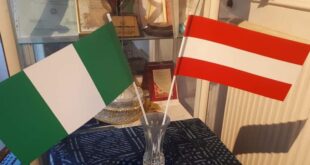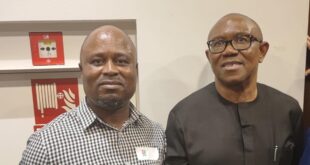
The racist attack on Noël Martin in June 1996 was one of the most internationally reported incidents of neo-Nazi violence in Germany in the 1990s. The attack left the British-Jamaican paralysed from the neck down and yet he found the strength to continue living, setting up a charitable foundation which campaigns against racial intolerance and promotes exchanges between German youths and their British counterparts. Noël Martin’s death on Tuesday brings to a closure one of the saddest stories of racist violence in post-reunification Germany
Noël Martin died on Tuesday (14 July) nine days to his 61st birthday in a hospital in his hometown of Birmingham, UK.
The Jamaican-born British citizen’s death brings to a closure one of the saddest stories of racist violence in post-reunification Germany.
Martin was a building contractor who came to Germany like many others from all parts of Europe in the 1990s amid the construction boom that followed reunification.
It was also a period marked by virulent anti-foreigner sentiments, fuelled by right-wing politicians, especially in the former East Germany.
Although he had endured taunts from young neo-Nazis while living in eastern Germany, but he could not have been prepared for the cruel fate that awaited him in the evening of 16 June 1996 in Mahlow, state of Brandenburg.
In the company of two other colleagues, also British-Jamaicans, he went to the train station to make a call to his partner Jacqueline Shields in the UK.
As Martin bided his love farewell, two racist thugs were waiting for him outside the telephone cabin.
The two German men, aged 17 and 24, insulted Martin and his two colleagues in front of the Mahlow train station.
They taunted the three Black men, called them the n-word and attempted to physically attack them. To avoid any fight with the neo-Nazi thugs, the three Black men quickly got into their car and Martin drove off.
But the two German men did not leave their victims alone, they also got into a car they had earlier stolen and chased Martin and his friends.
During the chase the neo-Nazis attempted to force Martin’s car off the road during which the younger of the assailants threw a six-kilo stone through the side window of their victims’ car, making Martin to lose control of his car which somersaulted before crashing into a tree.
Martin suffered fractures in the cervical spine and became paralysed from the neck down. His two passengers were only slightly injured.
From that moment, Noël Martin’s life ended, like he himself described his situation after the tragic incident.
He returned to Birmingham, requiring round-the-clock care, which for many years was provided by his partner Jacqueline. Thus began Martin’s 24-year ordeal on earth from which death released him on Tuesday.
“My life was taken away”
Martin described what he had to endure in an interview with German public broadcaster RBB in 2016: “My feet burn constantly, I need to do exercises all the time, and I can only go outside if it’s warm. Otherwise I have to sit inside by the heating. One year I only went outside three times, the rest of the time I was in hospital. I spent two years completely in hospital … Even in prison you’re allowed to walk around outside for an hour a day. I haven’t been able to do that for 20 years. My life was taken away.”
Jacqueline died of cancer on 12 April 2000, two days after their marriage, marking another turning point in Martin’s life.
The Jamaican-born British citizen returned to Germany in 2001 to lead an anti-racist demonstration. He thereafter initiated an exchange programme between young people from the state of Brandenburg and his hometown Birmingham to promote racial tolerance. The initiative, Noël and Jacqueline Martin Fund, supported by the state of Brandenburg, later became the Noël and Jacqueline Martin Foundation in 2008.
In 2006, with the emotional support of his deceased wife missing, Martin grew tired of living in his condition. He announced that he would receive assistance to end his life after his 48th birthday at Dignitas in Switzerland the following year. He later changed his mind saying he still had work to do with his foundation. “I didn’t want the neo-Nazis to declare victory,” he told RBB in 2016.
In his autobiography, titled Nenn es: mein Leben (“Call it: My Life”), Noël Martin wrote about how he managed to build his life from his humble beginnings and became successful as the owner of a flourishing handwork business despite many negative experiences. And how he came to Germany, where his life underwent a dramatic change.
Tributes have been paid to Noël Martin in Germany following his death.
“Despite many strokes of fate”
“With him we lose a person who never gave up despite many strokes of fate and always pursued his life’s goal. After the radical right-wing attack, he set himself the task of bringing young people from Great Britain and Germany together, teaching them about tolerance and international understanding, and thereby contributing to a better world,” Noël und Jacqueline Martin Foundation said in a tribute.
“He will be remembered forever as a courageous fighter against racism and exclusion, and for his commitment to young people. Rest in peace, Noel,” Green party politician Katrin Goring-Eckardt tweeted.
—–
Footnotes:
In December 1996, the district court of Potsdam sentenced the perpetrators to prison terms of five and eight years (five for the one who threw the rock and eight years for the driver of the chase car). However, none of the two neo-Nazi thugs showed any remorse despite the terrible consequences of their action.
The criminals have since served their prison terms and now live in freedom and until Martin’s death on Tuesday had refused to apologise for their action.
“Thinking about those two would be a waste of time. God and life will deal with them,” he told Der Spiegel magazine in 2006.
However, Noël Martin received financial compensation and a monthly pension from the government of the state of Brandenburg until his death.
Sola Jolaoso
 THE AFRICAN COURIER. Reporting Africa and its Diaspora! The African Courier is an international magazine published in Germany to report on Africa and the Diaspora African experience. The first issue of the bimonthly magazine appeared on the newsstands on 15 February 1998. The African Courier is a communication forum for European-African political, economic and cultural exchanges, and a voice for Africa in Europe.
THE AFRICAN COURIER. Reporting Africa and its Diaspora! The African Courier is an international magazine published in Germany to report on Africa and the Diaspora African experience. The first issue of the bimonthly magazine appeared on the newsstands on 15 February 1998. The African Courier is a communication forum for European-African political, economic and cultural exchanges, and a voice for Africa in Europe.





























